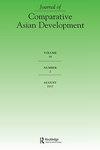冲突理论视角下双语素养和教育水平对民族自豪感的影响——以延边朝鲜族学生为例
Q3 Social Sciences
引用次数: 2
摘要
摘要本文主要研究韩国少数民族学生的双语水平、多维知识水平和教育阶段对其民族自豪感的影响。通过对693名中国朝鲜族高中生和大学生的数据分析,从冲突理论的角度检验了三个假设:(1)朝鲜族学生的双语能力对其民族自豪感有正向影响;(2)朝鲜族学生的多维知识对其民族自豪感有正向但有差异的影响;(3)从高中到大学,朝鲜族学生的民族自豪感随着双语教育项目的深入而增强。分析表明,双语能力和少数民族知识对学生的民族自豪感有正向影响,而散居知识和受教育程度对学生的民族自豪感有负向影响。朝鲜少数民族对向上流动的务实追求,以及由此引发的日益增多的冲突,可以从语境上解释为什么他们的民族自豪感无法在更高的教育水平上维持下去。本文章由计算机程序翻译,如有差异,请以英文原文为准。
The Impact of Bilingual Literacy and Education Level on Ethnic Pride from the Conflict Theoretical Perspective: A Case Study of Chinese Korean Minority Students in Yanbian
Abstract This article focuses on the impact of Korean minority students’ bilingual proficiency, multi-dimensional knowledge and educational stage on their ethnic pride. Analysis of data collected from 693 Chinese Korean minority high school and university students tests three hypotheses from the conflict theoretical perspective: (1) Korean minority students’ bilingual proficiency positively impacts on their ethnic pride, (2) their multi-dimensional knowledge impacts on their ethnic pride positively but differently, (3) from high school to university, their ethnic pride is strengthened as they are further exposed to the bilingual education programme. The analysis indicates that bilingual proficiency and minority knowledge positively contribute to students’ ethnic pride, but their diaspora knowledge and educational level have negative impacts on their ethnic pride. The Korean minority's pragmatic pursuit of upward mobility and the increasing conflicts it causes over time could contextually explain why their ethnic pride fails to sustain itself at higher levels of education.
求助全文
通过发布文献求助,成功后即可免费获取论文全文。
去求助
来源期刊

Journal of Comparative Asian Development
Social Sciences-Political Science and International Relations
CiteScore
1.30
自引率
0.00%
发文量
2
期刊介绍:
The Journal of Comparative Asian Development (JCAD) aims to offer the most up-to-date research, analyses, and findings on the many aspects of social, economic, and political development in contemporary Asia conducted by scholars and experts from Asia and around the world.
 求助内容:
求助内容: 应助结果提醒方式:
应助结果提醒方式:


